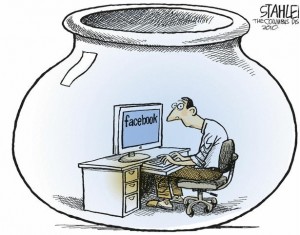Upon hearing the news of the NSA phone records-breach-of-privacy-scandal, I was a bit surprised at my own reaction–or rather, lack of reaction. It seemed like just another step in the direction of the new normal, brought on technology and the ubiquity of social networks. Every day, it seems, we surrender more and more of our  privacy to the gods of technology. We trade the commodity of our privacy for other goods: communication and expansion of personal networks, ease of purchasing, building our personal brand, and on it goes. Now, with the news of the NSA having accessed our personal phone records for years, we can nearly pass it off with a shrug. After all, we’re told that it’s a small price to pay for a great commodity we get in return: security (or, at the very least, the appearance of it).
privacy to the gods of technology. We trade the commodity of our privacy for other goods: communication and expansion of personal networks, ease of purchasing, building our personal brand, and on it goes. Now, with the news of the NSA having accessed our personal phone records for years, we can nearly pass it off with a shrug. After all, we’re told that it’s a small price to pay for a great commodity we get in return: security (or, at the very least, the appearance of it).
This situation became crystal clear for me while reading the following segment from Moral Blindness. The book is a fascinating conversation on the idea and state of modernity (“Liquid Modernity”) between Leonidas Donskis and Zygmunt Bauman. Donskis notes that, in his books Liquid Modernity and Liquid Surveillance, Bauman,
proclaimed that privacy is dead…If so, political liberty is on the way to disappearance. And we seem far from beating the drums at the threat. Instead, we celebrate it as our newly acquired security and a chance in the manner of a reality show to remind the world about our existence. (26)
Baumann goes on to elaborate on the “Faustian pact” we have signed, in which we “consent to the loss of privacy as a reasonable price for the wonders offered in exchange.” We gladly give up our privacy to connect with our high school friends on Facebook and to connect with potential employers or clients via LinkedIN. How much more do we consent to the Faustian exchange when we can gain the “wonder” of security against unimaginable threats and terrors?
The water is running fast, we’re afloat, and it’s hard to see us swimming the other way in this “Liquid Modernity.” But what kind of security do we really have, if the price is privacy and (whatever sort we still might have), individual autonomy?











